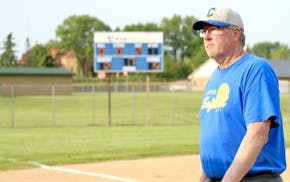Now that the Minnesota Wild has landed marquee free agents Zach Parise and Ryan Suter, the team's next big challenge awaits: trying to recoup its $196 million investment.
While the rush to buy jerseys and the uptick in season ticket sales is a good omen, the more important goal is sustaining fan interest into the winter and translating it into revenue through higher television ratings, corporate sponsorships and a National Hockey League playoff run next spring.
Even a first-round playoff series -- the team has not made the postseason in four years -- is a moneymaker. Tickets sell for up to 25 percent more, said Matt Majka, the Wild's chief operating officer. The deeper a team goes into the playoffs, the more beer, hot dogs and commemorative T-shirts get sold. Majka said a playoff run, even one that does not yield a Stanley Cup, "can be a difference-maker" in a team's year-end revenue picture.
"We've been in a valley recently as an organization," Majka said. But corporate partners and sponsors, he said, are "going to be more willing to take our phone calls [than] they were last week because this makes a difference to them, as well."
John Solow, who heads the University of Iowa's economics department and has written on the economics of sports, said that making the playoffs is "gravy" for NHL teams in terms of revenue. But Solow said that in the United States the overriding goal for pro sports team owners is to make money. In Europe, he said, some owners spend money to buy a winning team without making an equal priority of the "hot dogs, or beer sold at the game, or broadcast rights.
"In the United States, we tend to think much more that it's about making a profit," he said. "In that world, you would only make these commitments" to guaranteed contracts for Parise and Suter "if you thought that it would bring in enough extra bucks."
The focus on profits can, at times, make the illogical logical. NHL and NBC-TV executives hailed this year's playoffs a success -- even though television ratings, according to the Sports Business Journal, were down 33 percent for the Stanley Cup final, the best-of-seven championship series. The reason for the optimism: Every playoff game was televised in its entirety for the first time, so sponsorships and advertising revenue were up simply because more games were broadcast.
Sponsorship is valued
The NHL has other good financial news that could make a big investment a good investment.
More than 60 percent of avid NHL fans said this year they were more likely to recommend an official NHL sponsor -- such as Honda -- to a family member or friend. The figure, reported by the Sports Business Journal, was up from 41.9 percent in 2010.
Neil Longley, a University of Massachusetts professor who has studied the economics of hockey, said the Wild's high-profile signings also make much more sense for an NHL team from a hockey hotbed like Minnesota than from a Sun Belt team such as the Tampa Bay Lightning. The Wild, he said, is a franchise that has likely just had some off years and is "not fully capturing that revenue potential."
In contrast, a Sun Belt team in the NHL -- even one with success -- typically has local television ratings "barely registering above zero," he said.
Despite the crushing national recession, the Wild's signing of Parise and Suter is also a bet that the landscape for professional sports continues its upward spiral.
A new study by W.R. Hambrecht & Co., a San Francisco-based sports finance group, reports that personal consumption spending on spectator sports in the United States has reached $25.4 billion and shown a 6.4 percent compound annual growth rate -- much more than the 2.6 percent rate for all personal consumption spending.
The sports industry had not just weathered the recession, the study said, "but has shown strong growth, with each of the four major professional leagues posting year-over-year revenue increases."
League revenue, the report said, jumped for all four major pro sports and, for the NHL, topped $3 billion in 2011. Over the past six years, the average operating income for the NHL had a 0.2 percent compound annual growth rate. The figure was far behind the 11.5 percent rate for the National Football League but higher than the National Basketball Association's rate and the same as major league baseball's figure.
The Wild, the report said, had a 5.5 percent compound annual growth rate in franchise value over the past six years -- a jump that brought the franchise value to an estimated $213 million.
Signing Parise and Suter did have its hiccups.
Michael Dimond, the general manager of Fox Sports North, which televises many of the Wild's games locally, said he was surprised the announcement did not make a bigger splash across the country. On the day after the signings, Sports Illustrated's website featured instead the NBA and the trade of Steve Nash to the Los Angeles Lakers.
"It didn't get the national play that you would think it would," Dimond said.
But he said there was no doubt what the top local sports story was.
"We will see higher ratings," he said.
Mike Kaszuba • 612-673-4388
Federal appeals court overturns West Virginia transgender sports ban
Wild's defense had all kinds of problems — and one breakout star
Caitlin Clark and Angel Reese hope to carry over college momentum to the WNBA

Series: What's happening at the U as NIL rules rock college sports?

